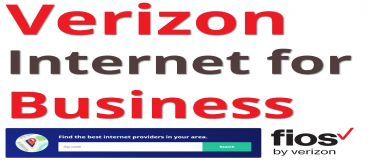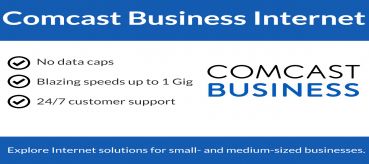Do you want to take your business on the road? Here's how to get internet while traveling.

Remote workers can connect to the internet via satellite internet, wireless, or public Wi-Fi. To decide which is the best, we looked at the numbers.
In 2020, the COVID-19 pandemic changed everything, requiring most of the country to work, learn, and communicate digitally for the first time. One of the pandemic's ripple impacts is already clear: remote work isn't going anywhere when the planet returns to a more natural state in the future.
The only stipulation is that you have a stable internet connection. We analyzed data from thousands of satellite and wireless connections to see which ones have the best speeds to help remote workers find the best choice for their situation.
Find the Best Internet for Business
Although wireless is the fastest alternative, most carriers impose data limits.
You probably don't need to search any further than the smartphone in your pocket if you're searching for the best speeds possible for work on the go. In the United States, most cellphone plans provide download speeds of about 72 Mbps, which is sufficient for most remote work activities.
However, you won't be able to get those high speeds everywhere in the world. The strongest wireless networks, as you would imagine, are concentrated in urban areas. If you want to travel to more remote locations, particularly in the western half of the country, you'll likely have trouble finding a data link at all, let alone one powerful enough to support remote work.
You'll need to set up a mobile hotspot to use your smartphone's data plan for remote work. Most telecom providers provide hotspot connectivity in their plans, but there is usually a limit to how much bandwidth you can use with it, and it isn't always included in the cheaper phone plans.
The "big three" carriers are compared as follows:
AT&T internet Includes 15GB to 30GB of data, which is then slowed to 128 Kbps. There are also data-only plans for connected devices, which cost $60 per month for 15GB and $85 per month for 35GB.
T-Mobile provides 5GB to 40GB of data for free, followed by limitless data at 3G rates. Data-only plans for connected devices vary in price from $5 per month (500MB) to $40 per month (1000MB) (30GB).
Verizon offers 15GB to 30GB of 4G/5G data, as well as unrestricted 3G hotspot data. For $20 to $30 a month, you can add unlimited data on laptops to your current contract.
Find the Best Internet for Business
What kind of data do I need to work from home?
You will probably get away with 20 to 30GB of mobile hotspot data each month if your job activity is limited to networking apps like Slack, web surfing, and the occasional Zoom meeting. Most people's biggest bandwidth hogs are video calls, which consume around 3GB per hour compared to just 50MB for web browsing and checking email. If you're concerned about exceeding your data limit, you can save money by reducing video and audio quality, turning off video entirely, or installing an ad blocker on your browser.
While public Wi-Fi is plentiful, it is often sluggish.
If you want to operate remotely using public Wi-Fi, you'll probably have to deal with much slower speeds than you will with wireless or satellite. According to data from Rotten Wifi, connections using public Wi-Fi had an average download speed of only 3.3 Mbps and an upload speed of only 2.7 Mbps — the slowest of any connection form.
Even though that sounds poor, 3.3 Mbps is still faster than Zoom's recommended download speeds for 720p HD video, which are 2.6 Mbps. These speed guidelines, however, are often on the low side. According to San Francisco State University researchers, anything less than 5 Mbps is insufficient for Zoom, and 20 Mbps is recommended for smooth video conferencing.
The great news is that finding a good public Wi-Fi connection shouldn't be too difficult. According to Statista, there were over 450 million public Wi-Fi hotspots around the world in 2020, with that figure predicted to increase to 540 million.
However, using the public internet exposes the machine to threats that other links do not. You may want to consider adding extra security measures to your work machine, such as using a VPN to secure it when it's connected to public wifi.
While satellite internet provides sufficient speeds, it is costly if you are traveling.
If you need to operate from a remote location without access to the internet, satellite internet is a good choice, but it can get expensive if you want to take your link with you. According to our research, the average satellite internet link has a download speed of 15.4 megabits per second. It won't break any speed records, but it should suffice for the majority of remote work tasks.
The large proportion of satellite connections, on the other hand, are stable. If you want to connect your RV or van to the internet via satellite, you'll likely have to spend a considerable amount of money upfront. The cost of a satellite dish can range from a few hundred dollars to tens of thousands of dollars, and that's before you pay for monthly service. For existing residential customers, DISH and HughesNet also sell add-on mobile plans, and RVDataSat provides full RV internet systems priced at $6,995 just to get started.
What kind of internet access do I need to work from home?
For one person working remotely, we suggest download speeds of about 25 Mbps, but depending on the type of work you do, you might be able to get away with even less. Simple tasks like checking email and browsing the web just necessitate download speeds of about 1 Mbps. Video calls use the most bandwidth of any work job, and Zoom only recommends upload and download speeds of about 2 Mbps.
However, several users have stated that these figures are on the low side, so you should aim for at least 5 Mbps before jumping on video conferencing.
Related Posts
Wed, Apr 22, 2020 11:34 PM
Find Verizon Internet for Business Near You!
Verizon provides Internet for business in more than 40 states in the US, speeds are limited to 15 Mbps, and many businesses will need more juice. If you're in the Northeast, you can enjoy high-speed Internet via Verizon's FiOS. This is ideal for businesses that need high speeds, such as restaurants, hotels, medical facilities, hospitals, schools, and other businesses.
Thu, Apr 23, 2020 12:00 AM
5 Best Small Business Internet Service Providers (2021)
The following Internet Service Providers are not listed in any particular order, but we have ranked these five companies as worthwhile due to some key factors such as speed, reliability, cost, and overall customer satisfaction.
Mon, Apr 20, 2020 11:13 PM
Business Internet Guides for Entrepreneurs
Small businesses need to grow, but how big should your business become before you buy it online? Whether you started out as a sideshow or a brick-and-mortar business, successful small businesses are finding it increasingly difficult to decide when to shell out money for an Internet business.
Thu, Apr 23, 2020 11:52 PM
Why Business Internet is More Expensive Than Residential Internet
This question is asked so often today that it seems worth explaining, but here are 5 reasons why business Internet is more expensive than Residential Internet packages.
Fri, Apr 24, 2020 5:17 AM
Comcast Internet For Business: Internet, Phone, TV, and Other Solutions for your Business.
Comcast Business is US largest cable provider for small and medium-sized businesses and has become a force in the market, recognized by leading industry over the past two years as one of the fastest-growing providers of high-speed broadband to business customers




